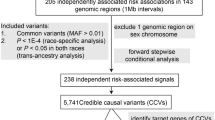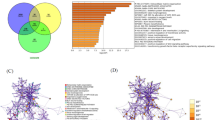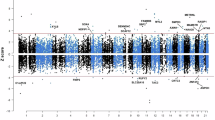Abstract
Up to 25% of colorectal cancer (CRC) may be caused by inherited genetic variants that have yet to be identified. Previous genome-wide linkage studies (GWLSs) have identified a new loci postulated to contain novel CRC risk genes amongst affected families carrying no identifiable mutations in any of the known susceptibility genes for familial CRC syndromes. To undertake a new GWLS, we recruited members from 54 non-syndromic families from Australia and Spain where at least two first-degree relatives were affected by CRC. We used single-nucleotide polymorphism arrays to genotype 98 concordant affected relative pairs that were informative for linkage analyses. We tested for genome-wide significance (GWS) for linkage to CRC using a quantile statistic method, and we found that GWS was achieved at the 5% level. Independently, using the PSEUDO gene-dropping algorithm, we also found that GWS for linkage to CRC was achieved (P=0.02). Merlin non-parametric linkage analysis revealed significant linkage to CRC for chromosomal region 10p15.3–p15.1 and suggestive linkage to CRC for regions on 14q and 9q. The 10p15.3–p15.1 has not been reported to be linked to hereditary CRC in previous linkage studies, but this region does harbour the Kruppel-like factor 6 (KLF6) gene that is known to be altered in common CRC. Further studies aimed at localising the responsible genes, and characterising their function will give insight into the factors responsible for susceptibility in such families, and perhaps shed further light on the mechanisms of CRC development.
Similar content being viewed by others
Log in or create a free account to read this content
Gain free access to this article, as well as selected content from this journal and more on nature.com
or
References
Johns LE, Houlston RS : A systematic review and meta-analysis of familial colorectal cancer risk. Am J Gastroenterol 2001; 96: 2992–3003.
Lipton LR, Johnson V, Cummings C et al: Refining the Amsterdam Criteria and Bethesda Guidelines: testing algorithms for the prediction of mismatch repair mutation status in the familial cancer clinic. J Clin Oncol 2004; 22: 4934–4943.
Terdiman JP, Conrad PG, Sleisenger MH : Genetic testing in hereditary colorectal cancer: indications and procedures. Am J Gastroenterol 1999; 94: 2344–2356.
Vasen HF, Mecklin JP, Khan PM, Lynch HT : The International Collaborative Group on Hereditary Non-Polyposis Colorectal Cancer (ICG-HNPCC). Dis Colon Rectum 1991; 34: 424–425.
Lindor NM, Rabe K, Petersen GM et al: Lower cancer incidence in Amsterdam-I criteria families without mismatch repair deficiency: familial colorectal cancer type X. JAMA 2005; 293: 1979–1985.
Lipkin SM, Afrasiabi K : Familial colorectal cancer syndrome X. Semin Oncol 2007; 34: 425–427.
Papaemmanuil E, Carvajal-Carmona L, Sellick GS et al: Deciphering the genetics of hereditary non-syndromic colorectal cancer. Eur J Hum Genet 2008; 16: 1477–1486.
Wiesner GL, Daley D, Lewis S et al: A subset of familial colorectal neoplasia kindreds linked to chromosome 9q22.2-31.2. Proc Natl Acad Sci U S A 2003; 100: 12961–12965.
Daley D, Lewis S, Platzer P et al: Identification of susceptibility genes for cancer in a genome-wide scan: results from the colon neoplasia sibling study. Am J Hum Genet 2008; 82: 723–736.
Kemp Z, Carvajal-Carmona L, Spain S et al: Evidence for a colorectal cancer susceptibility locus on chromosome 3q21-q24 from a high-density SNP genome-wide linkage scan. Hum Mol Genet 2006; 15: 2903–2910.
Kemp ZE, Carvajal-Carmona LG, Barclay E et al: Evidence of linkage to chromosome 9q22.33 in colorectal cancer kindreds from the United Kingdom. Cancer Res 2006; 66: 5003–5006.
Picelli S, Vandrovcova J, Jones S et al: Genome-wide linkage scan for colorectal cancer susceptibility genes supports linkage to chromosome 3q. BMC Cancer 2008; 8: 87.
Djureinovic T, Skoglund J, Vandrovcova J et al: A genome wide linkage analysis in Swedish families with hereditary non-familial adenomatous polyposis/non-hereditary non-polyposis colorectal cancer. Gut 2006; 55: 362–366.
Neklason DW, Kerber RA, Nilson DB et al: Common familial colorectal cancer linked to chromosome 7q31: a genome-wide analysis. Cancer Res 2008; 68: 8993–8997.
Gray-McGuire C, Guda K, Adrianto I et al: Confirmation of linkage to and localization of familial colon cancer risk haplotype on chromosome 9q22. Cancer Res 2010; 70: 5409–5418.
Weber MF, Banks E, Ward R, Sitas F : Population characteristics related to colorectal cancer testing in New South Wales, Australia: results from the 45 and Up Study cohort. J Med Screen 2008; 15: 137–142.
Ribes J, Navarro M, Cleries R et al: Colorectal cancer mortality in Spain: trends and projections for 1985–2019. Eur J Gastroenterol Hepatol 2009; 21: 92–100.
Saunders IW, Hannan GN, Brohede J et al: A range of simple summary genome-wide statistics for detecting genetic linkage using high density marker data. Genet Epidemiol 2007; 31: 565–576.
Wigginton JE, Abecasis GR : An evaluation of the replicate pool method: quick estimation of genome-wide linkage peak p-values. Genet Epidemiol 2006; 30: 320–332.
Baum L, Petrie T, Soules G, Weiss N : A maximization technique occuring in the statistical analysis of probabilistic functions of Markov Chains. Ann Math Statist 1970; 41: 164–171.
Saunders IW, Brohede J, Hannan GN : Estimating genotyping error rates from Mendelian errors in SNP array genotypes and their impact on inference. Genomics 2007; 90: 291–296.
Abecasis GR, Cherny SS, Cookson WO, Cardon LR : Merlin – rapid analysis of dense genetic maps using sparse gene flow trees. Nat Genet 2002; 30: 97–101.
Kong A, Cox NJ : Allele-sharing models: LOD scores and accurate linkage tests. Am J Hum Genet 1997; 61: 1179–1188.
Whittemore AS, Halpern J : A class of tests for linkage using affected pedigree members. Biometrics 1994; 50: 118–127.
Lander E, Kruglyak L : Genetic dissection of complex traits: guidelines for interpreting and reporting linkage results. Nat Genet 1995; 11: 241–247.
Miyaki M, Yamaguchi T, Iijima T, Funata N, Mori T : Difference in the role of loss of heterozygosity at 10p15 (KLF6 locus) in colorectal carcinogenesis between sporadic and familial adenomatous polyposis and hereditary nonpolyposis colorectal cancer patients. Oncology 2006; 71: 131–135.
Pruitt KD, Tatusova T, Maglott DR : NCBI reference sequences (RefSeq): a curated non-redundant sequence database of genomes, transcripts and proteins. Nucleic Acids Res 2007; 35: D61–D65.
Narla G, Heath KE, Reeves HL et al: KLF6, a candidate tumor suppressor gene mutated in prostate cancer. Science 2001; 294: 2563–2566.
Reeves HL, Narla G, Ogunbiyi O et al: Kruppel-like factor 6 (KLF6) is a tumor-suppressor gene frequently inactivated in colorectal cancer. Gastroenterology 2004; 126: 1090–1103.
Safran M, Chalifa-Caspi V, Shmueli O et al: Human gene-centric databases at the Weizmann institute of science: GeneCards, UDB, CroW 21 and HORDE. Nucleic Acids Res 2003; 31: 142–146.
Kury S, Buecher B, Robiou-du-Pont S et al: Low-penetrance alleles predisposing to sporadic colorectal cancers: a French case-controlled genetic association study. BMC Cancer 2008; 8: 326.
Seo T, Tatsuguchi A, Shinji S et al: Microsomal prostaglandin E synthase protein levels correlate with prognosis in colorectal cancer patients. Virchows Arch 2009; 454: 667–676.
Jones S, Hruban RH, Kamiyama M et al: Exomic sequencing identifies PALB2 as a pancreatic cancer susceptibility gene. Science 2009; 324: 217.
Kokko A, Laiho P, Lehtonen R et al: EPHB2 germline variants in patients with colorectal cancer or hyperplastic polyposis. BMC Cancer 2006; 6: 145.
Tenesa A, Campbell H, Barnetson R, Porteous M, Dunlop M, Farrington SM : Association of MUTYH and colorectal cancer. Br J Cancer 2006; 95: 239–242.
Vasen HF, Hendriks Y, de Jong AE et al: Identification of HNPCC by molecular analysis of colorectal and endometrial tumors. Dis Markers 2004; 20: 207–213.
Bodmer W : Familial adenomatous polyposis (FAP) and its gene, APC. Cytogenet Cell Genet 1999; 86: 99–104.
Tenesa A, Farrington SM, Prendergast JG et al: Genome-wide association scan identifies a colorectal cancer susceptibility locus on 11q23 and replicates risk loci at 8q24 and 18q21. Nat Genet 2008; 40: 631–637.
Tuupanen S, Turunen M, Lehtonen R et al: The common colorectal cancer predisposition SNP rs6983267 at chromosome 8q24 confers potential to enhanced Wnt signaling. Nat Genet 2009; 41: 885–890.
Skoglund Lundin J, Vandrovcova J, Song B et al: TGFBR1 variants TGFBR1(*)6A and Int7G24A are not associated with an increased familial colorectal cancer risk. Br J Cancer 2009; 100: 1674–1679.
Daley D, Morgan W, Lewis S et al: Is TGFBR1*6A a susceptibility allele for nonsyndromic familial colorectal neoplasia? Cancer Epidemiol Biomarkers Prev 2007; 16: 892–894.
O’Riordan J, O’Donoghue D, Green A et al: Hereditary mixed polyposis syndrome due to a Bmpr1a mutation. Colorectal Dis 2010; 12: 570–573.
Nassif NT, Lobo GP, Wu X et al: PTEN mutations are common in sporadic microsatellite stable colorectal cancer. Oncogene 2004; 23: 617–628.
Jaeger E, Webb E, Howarth K et al: Common genetic variants at the CRAC1 (HMPS) locus on chromosome 15q13.3 influence colorectal cancer risk. Nat Genet 2008; 40: 26–28.
Gemignani F, Moreno V, Landi S et al: A TP53 polymorphism is associated with increased risk of colorectal cancer and with reduced levels of TP53 mRNA. Oncogene 2004; 23: 1954–1956.
Russo A, Bazan V, Iacopetta B, Kerr D, Soussi T, Gebbia N : The TP53 colorectal cancer international collaborative study on the prognostic and predictive significance of p53 mutation: influence of tumor site, type of mutation, and adjuvant treatment. J Clin Oncol 2005; 23: 7518–7528.
Iacopetta B : TP53 mutation in colorectal cancer. Hum Mutat 2003; 21: 271–276.
Pittman AM, Naranjo S, Webb E et al: The colorectal cancer risk at 18q21 is caused by a novel variant altering SMAD7 expression. Genome Res 2009; 19: 987–993.
Royce SG, Alsop K, Haydon A et al: The role of SMAD4 in early onset colorectal cancer. Colorectal Dis 2010; 12: 213–219.
Resta N, Simone C, Mareni C et al: STK11 mutations in Peutz-Jeghers syndrome and sporadic colon cancer. Cancer Res 1998; 58: 4799–4801.
Acknowledgements
We thank the patients and their families for their participation in the study, Bernadette Viney and Kerry Phillips for clinical research nurse support and Drs Konsta Duesing and Mike Buckley for critically reviewing the manuscript.
Author information
Authors and Affiliations
Corresponding author
Ethics declarations
Competing interests
The authors declare no conflict of interest.
Additional information
Supplementary Information accompanies the paper on European Journal of Human Genetics website
Supplementary information
Rights and permissions
About this article
Cite this article
Saunders, I., Ross, J., Macrae, F. et al. Evidence of linkage to chromosomes 10p15.3–p15.1, 14q24.3–q31.1 and 9q33.3–q34.3 in non-syndromic colorectal cancer families. Eur J Hum Genet 20, 91–96 (2012). https://doi.org/10.1038/ejhg.2011.149
Received:
Revised:
Accepted:
Published:
Issue date:
DOI: https://doi.org/10.1038/ejhg.2011.149
Keywords
This article is cited by
-
Linkage analysis revealed risk loci on 6p21 and 18p11.2-q11.2 in familial colon and rectal cancer, respectively
European Journal of Human Genetics (2019)
-
Exome sequencing in one family with gastric- and rectal cancer
BMC Genetics (2016)
-
Little evidence for association between the TGFBR1*6A variant and colorectal cancer: a family-based association study on non-syndromic family members from Australia and Spain
BMC Cancer (2014)
-
An association between the PTGS2 rs5275 polymorphism and colorectal cancer risk in families with inherited non-syndromic predisposition
European Journal of Human Genetics (2013)
-
Effects of Kruppel-like factor 6 on osteosarcoma cell biological behavior
Tumor Biology (2013)



